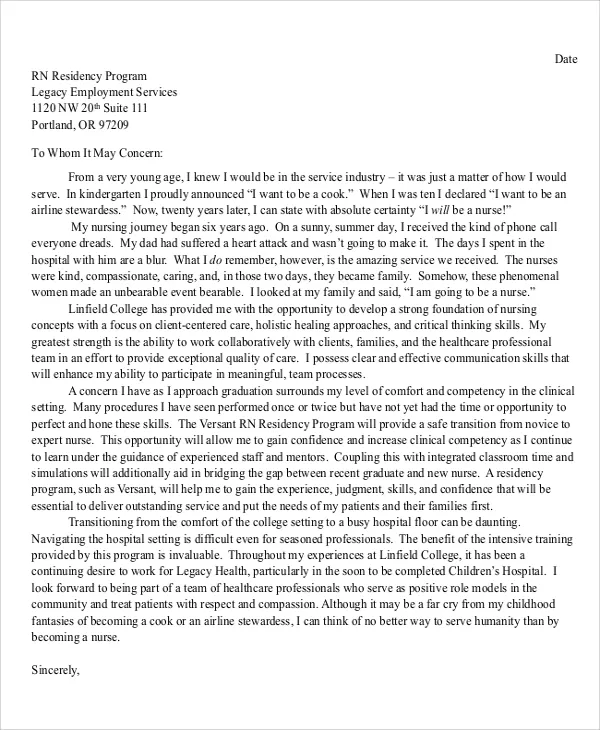What is a Nursing Cover Letter
A nursing cover letter is a crucial document that accompanies your nursing resume when applying for a job. It serves as your introduction to the hiring manager, providing a glimpse into your personality, skills, and experiences. Think of it as your personal sales pitch, highlighting why you are the perfect fit for the specific nursing position. Unlike a resume, which provides a factual account of your professional history, a cover letter allows you to express your passion for nursing and explain how your qualifications align with the needs of the employer. A well-written cover letter can significantly increase your chances of getting an interview by making a strong first impression.
Why Do You Need a Nursing Cover Letter
In the competitive field of nursing, a cover letter is not just recommended; it is often essential. Firstly, it offers a chance to personalize your application and demonstrate your genuine interest in the role and the healthcare organization. A generic resume can be easily overlooked, but a tailored cover letter immediately shows that you have taken the time to understand the job requirements and the employer’s values. Secondly, a cover letter allows you to elaborate on experiences and skills mentioned in your resume. You can provide context, explain specific accomplishments, and highlight how your abilities align with the specific needs of the position. Finally, a cover letter can showcase your communication skills, which are critical in nursing. It demonstrates your ability to articulate your thoughts and convey professionalism, setting you apart from other applicants.
Key Components of a Nursing Cover Letter
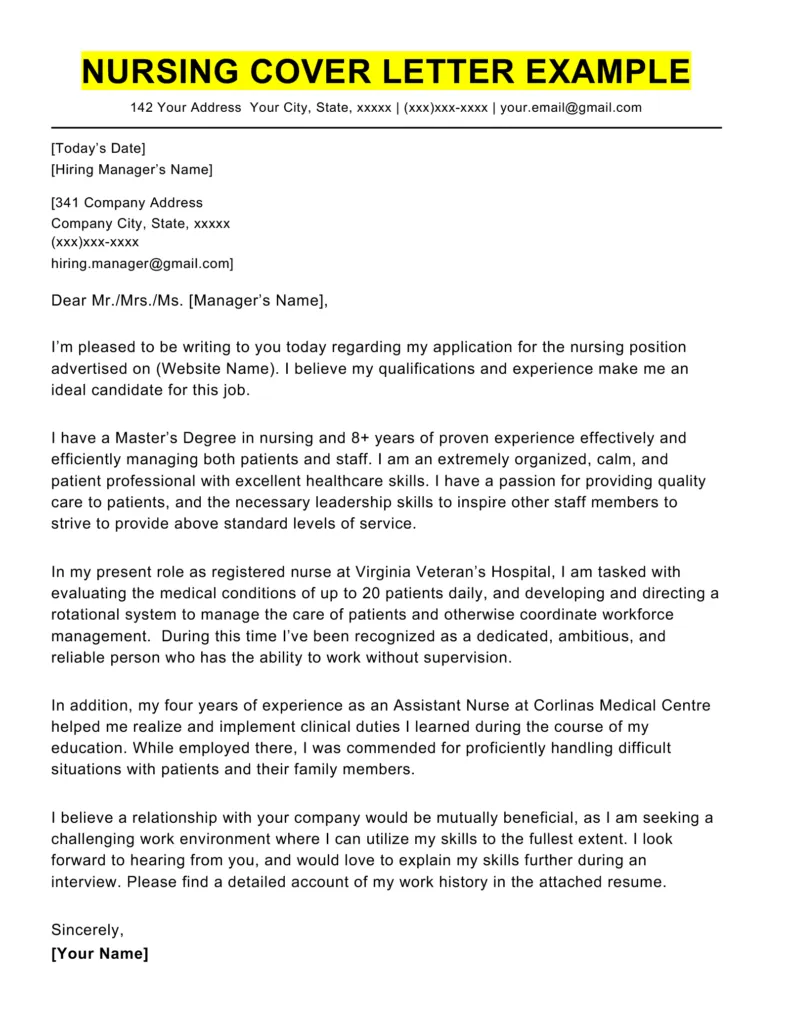
A well-structured nursing cover letter typically includes several key components. Each section plays a vital role in conveying your qualifications and enthusiasm to the hiring manager. By addressing these core elements, you can create a compelling narrative that increases your chances of securing an interview.
Header and Contact Information
The header of your nursing cover letter should include your contact information and the hiring manager’s details. This ensures that the employer can easily reach you if they want to schedule an interview. Correct formatting and accuracy in this section are crucial for professionalism.
Applicant’s Information
At the top of your cover letter, include your full name, phone number, email address, and optionally, your LinkedIn profile URL. Ensure your email address sounds professional. This section allows the employer to reach out to you quickly. Consider using a professional font and layout for this section.
Hiring Manager’s Information
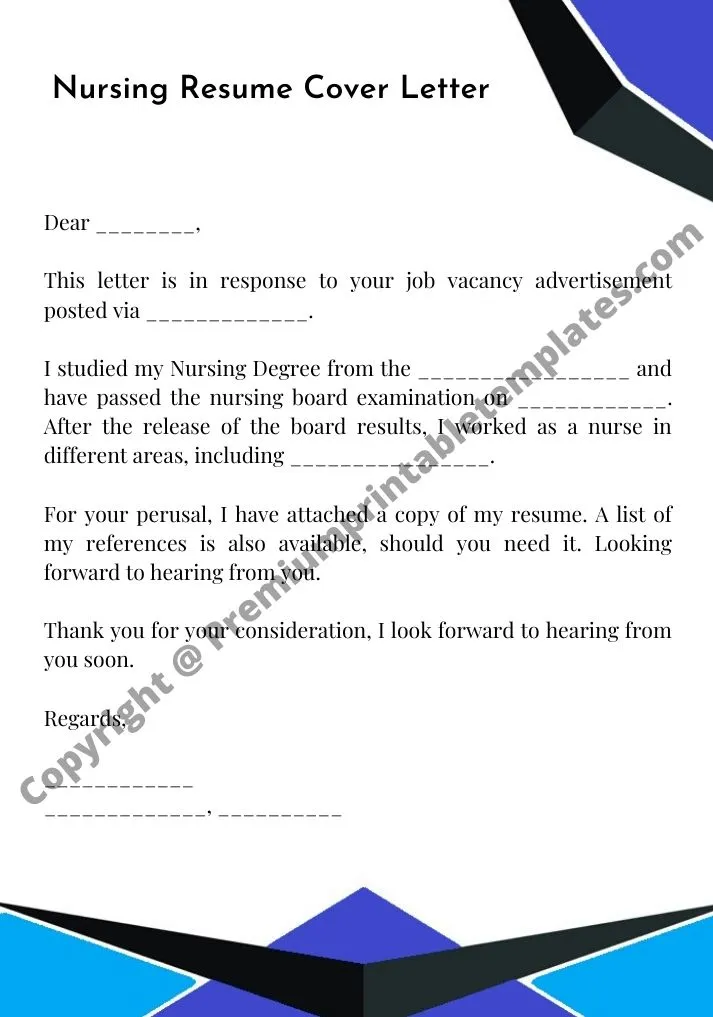
If possible, address your cover letter to a specific person, such as the hiring manager or the nurse manager of the department. If you can find their name, it shows you have put in the effort and attention to detail. Include their full name, title, and the name of the hospital or clinic, along with the address. If you are unable to find the hiring manager’s name, use a generic salutation like ‘Dear Hiring Manager’ or ‘Dear Nursing Team’.
The Opening Grabbing Attention
The opening paragraph of your cover letter should grab the reader’s attention and immediately state your purpose. This is your first opportunity to make a positive impression. A strong opening clearly states the position you are applying for and why you are interested in the opportunity. It should also reflect your understanding of the healthcare organization’s values and mission.
Expressing Enthusiasm
Show genuine enthusiasm for the position and the healthcare facility. Demonstrate your passion for nursing and your commitment to providing excellent patient care. This can be achieved by expressing your interest in the specific nursing role and the organization’s mission and values. Be specific about why you are excited about the opportunity.
Referencing the Job
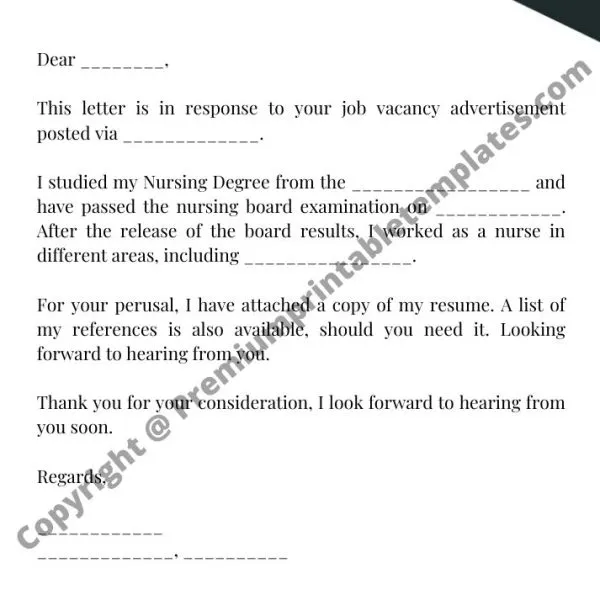
In the opening paragraph, clearly state the position you are applying for and where you found the job posting. This helps the hiring manager quickly understand which role you are interested in. Mention the job title and the source where you saw the advertisement, whether it was a job board, the hospital website, or a professional network.
Highlighting Your Skills and Experience
This section is the core of your cover letter, where you showcase your relevant skills and experience. Connect your qualifications with the requirements of the job description. Use specific examples to illustrate your abilities and accomplishments. This helps the hiring manager understand how you can contribute to their team.
Showcasing Relevant Experience
Describe your relevant nursing experience, highlighting the areas that align with the job description. If the job requires experience in a specific specialty, such as critical care or pediatrics, make sure to emphasize those aspects of your background. Mention your previous roles, the responsibilities you held, and the types of patients you cared for. Tailor your description to match the needs of the employer.
Quantifying Achievements
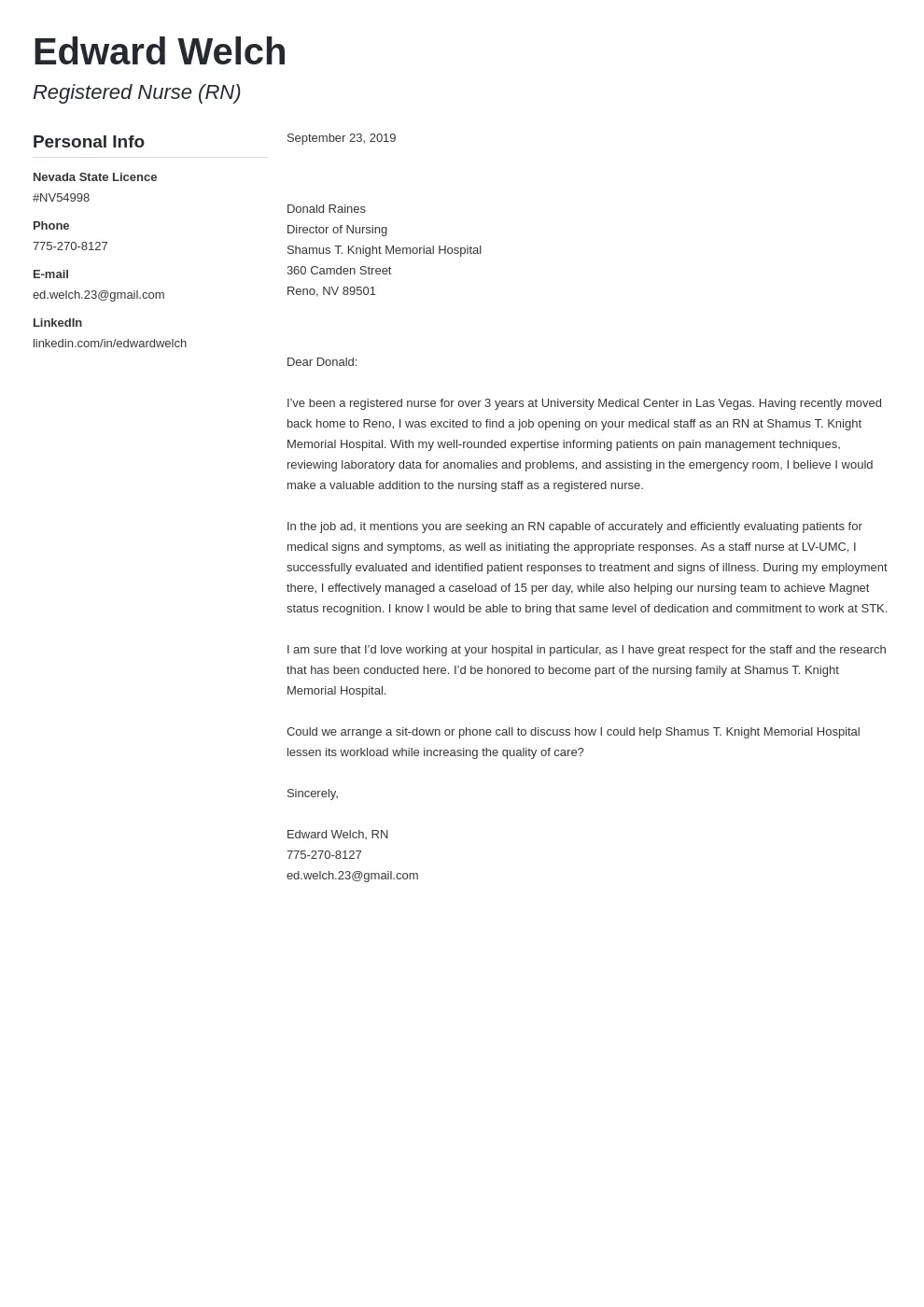
Whenever possible, quantify your achievements with data and metrics. For example, instead of saying ‘Improved patient outcomes,’ you could say, ‘Reduced patient fall rates by 15% through implementation of new safety protocols.’ Quantifying your accomplishments provides concrete evidence of your capabilities and demonstrates your impact on patient care.
Tailoring to the Job Description
Carefully review the job description and tailor your cover letter to match the requirements. Identify the key skills and qualifications the employer is seeking and highlight your relevant experiences. Use keywords from the job posting to help your cover letter get noticed by applicant tracking systems (ATS). This demonstrates to the hiring manager that you have paid attention to their needs.
Demonstrating Fit with the Organization
Show that you have researched the healthcare organization and understand its mission, values, and goals. Explain how your skills and experiences align with the organization’s culture and objectives. Mention any specific programs or initiatives that appeal to you and demonstrate how you can contribute. Expressing your interest in the organization shows a genuine interest and increases your chances of standing out.
The Closing Call to Action
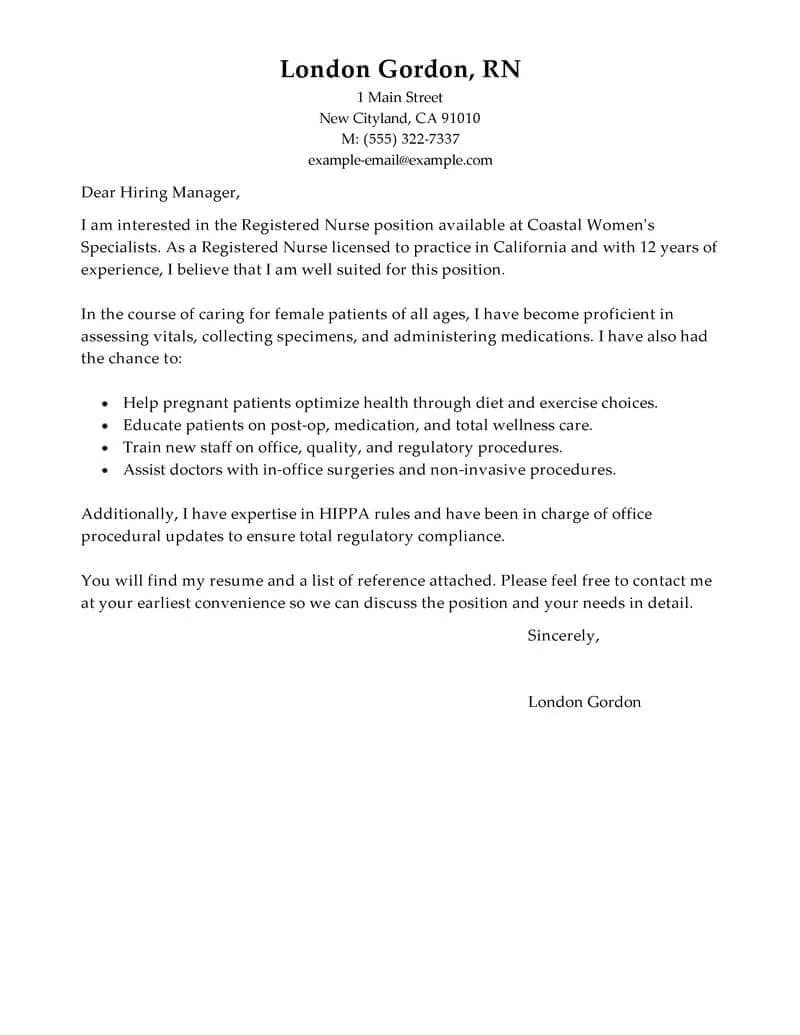
The closing paragraph should reiterate your interest in the position and provide a clear call to action. This is your final opportunity to make a lasting impression on the hiring manager.
Expressing Gratitude
Thank the hiring manager for their time and consideration. This demonstrates professionalism and respect. A brief expression of gratitude can make a positive impact and show that you appreciate the opportunity to be considered for the position.
Reiterating Interest
Reiterate your interest in the position and express your eagerness to discuss your qualifications further. End with a call to action, such as stating that you are available for an interview at their earliest convenience. Reassure the hiring manager of your enthusiasm for the role and the organization.
Formatting and Style
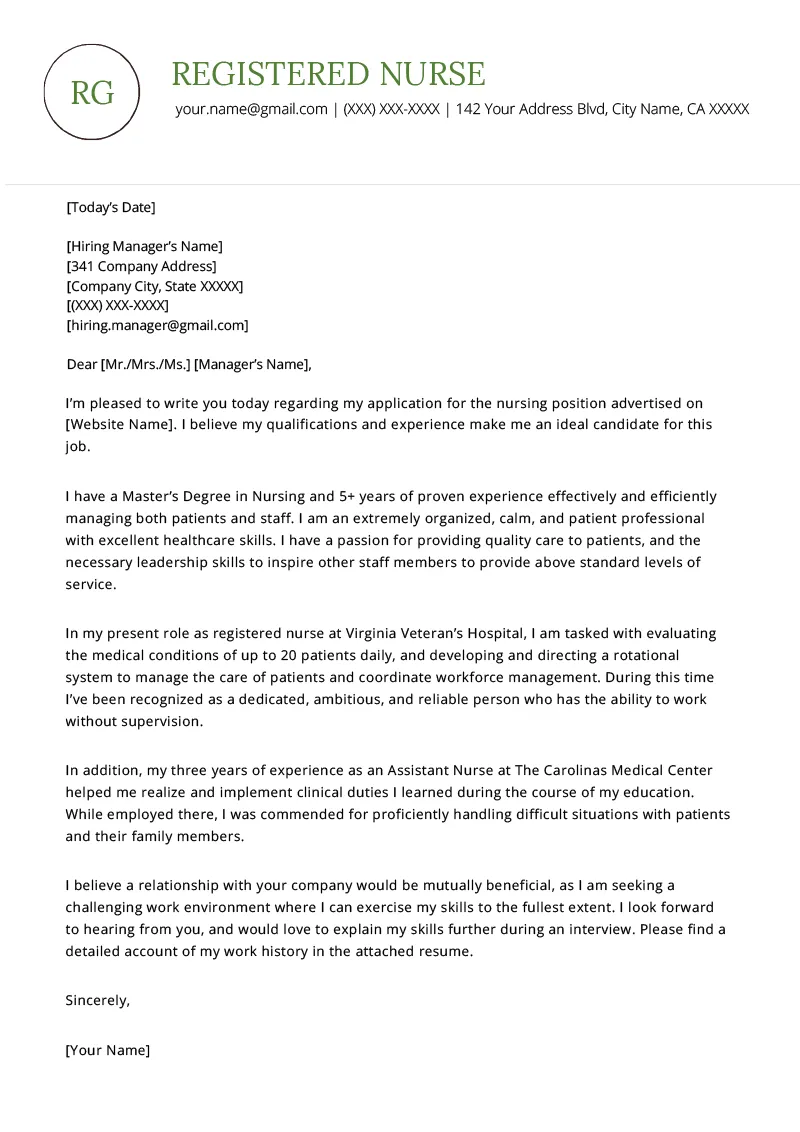
The formatting and style of your nursing cover letter are as important as its content. A well-formatted letter is easy to read and conveys professionalism. Pay close attention to the font, layout, and overall appearance of your cover letter to ensure a polished presentation.
Font and Layout
Choose a professional and readable font, such as Times New Roman, Arial, or Calibri. Use a standard font size (10-12 points) to ensure readability. Maintain consistent formatting throughout the document, with clear headings and subheadings. Use a layout that allows for ample white space, making the letter easy to scan. Avoid using complex designs or unnecessary graphics.
Proofreading and Editing
Proofread your cover letter carefully for any grammatical errors, typos, or spelling mistakes. These errors can make a negative impression and undermine your credibility. Ensure your sentences are well-structured and easy to understand. Consider having a friend or colleague review your cover letter for clarity and accuracy. Paying attention to detail is essential to demonstrate your professionalism. Careful proofreading shows that you are committed to providing high-quality work and attention to detail. Proofread multiple times to avoid any errors.
Common Mistakes to Avoid
Avoid common mistakes that can hurt your chances of getting an interview. Pay close attention to these points to ensure your cover letter is effective and professional.
Generic Letters
Avoid using a generic cover letter that can be sent to any employer. Tailor your cover letter to each specific job you apply for. Customize your letter to reflect the requirements of the position and the values of the healthcare organization. Generic cover letters show a lack of effort and interest, diminishing your chances of getting noticed. Show you care by making it specific.
Typos and Grammatical Errors
Always proofread your cover letter carefully to avoid typos and grammatical errors. These errors can create a negative impression and suggest a lack of attention to detail. Use spell-check and grammar-check tools, but also read your letter multiple times to catch any mistakes that those tools might miss. Ensure your writing is clear, concise, and professional.
Ignoring the Job Description
Make sure your cover letter addresses the specific requirements and qualifications listed in the job description. Highlight how your skills and experiences match the employer’s needs. Failing to address the job description indicates that you have not fully understood the role, which can lead to rejection. Take the time to align your application with the specific job requirements.
Examples of Effective Nursing Cover Letters
Reviewing examples of effective nursing cover letters can provide valuable guidance. Look for examples that demonstrate strong writing, tailored content, and a clear focus on the applicant’s qualifications. Consider the specific details and experiences highlighted in the examples, and use them as inspiration for crafting your own cover letter. Use templates as a basis but modify to fit your needs. Tailor the examples to your own experiences and the specific job you are applying for. By analyzing successful examples, you can learn best practices and improve your cover letter writing skills.
